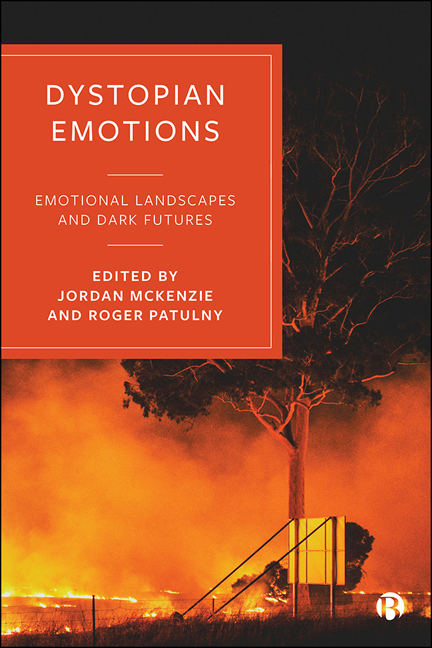Book contents
- Frontmatter
- Contents
- Notes on Contributors
- Acknowledgements
- Introduction: The Feeling of Dystopia
- 1 Borderland Emotions: A Case Study of Youths in Kinmen, Taiwan
- 2 Beyond Wicked Facebook: A Vital Materialism Perspective
- 3 Detangling Online Dystopias: Emotional Reflexivity and Cyber-Deviance
- 4 Mass Emotional Events: Rethinking Emotional Contagions after COVID-19
- 5 Between the Nationalists and the Fundamentalists, Still We Have Hope!
- 6 ‘The New Economy and the Privilege of Feeling’: Towards a Theory of Emotional Structuration
- 7 Neo-Villeiny University
- 8 Resuscitating the Past: Zygmunt Bauman’s Critical Analysis of the Recent Rise of Retrotopia
- 9 Hope Out of Stock: Critical and Melancholic Hope in Climate Fiction
- Conclusion: A Critical Mass of Emotions – Reflexivity, Loneliness and Hope?
- Index
Introduction: The Feeling of Dystopia
Published online by Cambridge University Press: 13 May 2022
- Frontmatter
- Contents
- Notes on Contributors
- Acknowledgements
- Introduction: The Feeling of Dystopia
- 1 Borderland Emotions: A Case Study of Youths in Kinmen, Taiwan
- 2 Beyond Wicked Facebook: A Vital Materialism Perspective
- 3 Detangling Online Dystopias: Emotional Reflexivity and Cyber-Deviance
- 4 Mass Emotional Events: Rethinking Emotional Contagions after COVID-19
- 5 Between the Nationalists and the Fundamentalists, Still We Have Hope!
- 6 ‘The New Economy and the Privilege of Feeling’: Towards a Theory of Emotional Structuration
- 7 Neo-Villeiny University
- 8 Resuscitating the Past: Zygmunt Bauman’s Critical Analysis of the Recent Rise of Retrotopia
- 9 Hope Out of Stock: Critical and Melancholic Hope in Climate Fiction
- Conclusion: A Critical Mass of Emotions – Reflexivity, Loneliness and Hope?
- Index
Summary
As a PhD student I remember hearing a senior professor insist that sociologists should wait at least 20 years before commenting on current events. He claimed that sociological knowledge could only be reliably generated when sufficient time had passed for reflection, and for events to become a part of history. Furthermore, he argued that any endeavour to predict or preempt the future was a reckless and calamitous venture that sank below the standards of real academic work. While I have a lot of time for historical sociology, the editors of this collection do not believe that the advice of this professor should be taken so literally. There is perhaps no task more important for sociologists than making sense of the present and understanding the implications of what we find for the future. While no book can claim to be able to predict future events with any degree of certainty, sociology and its related disciplines need to look forward, and try to seriously engage with the possible worlds that lie ahead.
This book will specifically investigate the emotional consequences of perceived futures for individuals living in the present, and the open up new discourses about how people might feel in the future. It should be uncontroversial for sociologists and social researchers to investigate the emotional consequences of the past, present and future. Furthermore, there is also a need for social researchers to think seriously about how people might feel differently in the future. As George Herbert Mead (1932, p. 12) notes, insofar as human beings can reconstruct history and imagine the world to come, ‘the past … is as hypothetical as the future’. More recently, Barbara Adam and Chris Groves have described ‘present futures’ and ‘future presents’ to distinguish between the futures that are already underway in the present, and the current perception of presents that are yet to come. Adam and Groves (2007, p. 36) conclude that in regard to the latter, ‘the scientific mode of inquiry has no tools with which to engage with future presents’.
Though there is much that we do not know about the future, social researchers need to develop ways to discuss future presents without becoming futurists or determinists.
- Type
- Chapter
- Information
- Dystopian EmotionsEmotional Landscapes and Dark Futures, pp. 1 - 15Publisher: Bristol University PressPrint publication year: 2021



